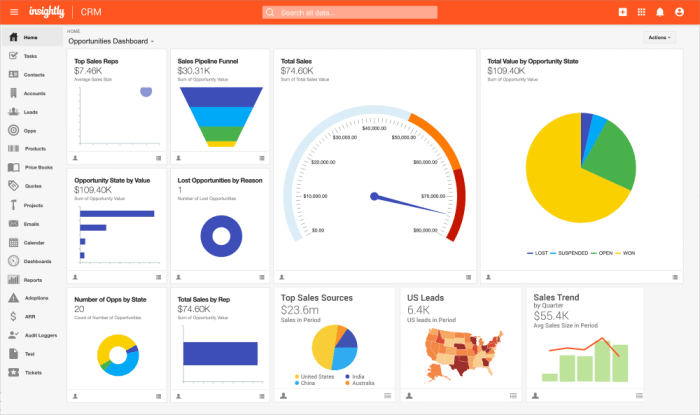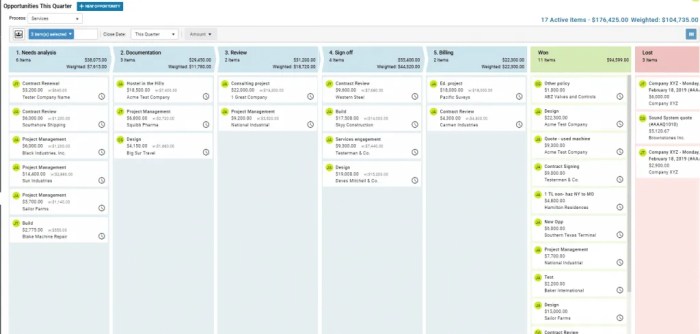Crm software for manufacturing industry – The manufacturing industry is undergoing a significant digital transformation, and Customer Relationship Management (CRM) software is playing a crucial role in this evolution. Efficiently managing customer interactions, streamlining processes, and improving overall productivity are key to success in today’s competitive landscape. This comprehensive guide delves into the specifics of CRM software tailored for the manufacturing sector, exploring its benefits, functionalities, and implementation strategies.
We’ll also address common questions and concerns surrounding its adoption.
Understanding the Unique Needs of Manufacturing CRM: Crm Software For Manufacturing Industry
Unlike other industries, manufacturing businesses have unique requirements that necessitate specialized CRM solutions. These include handling complex supply chains, managing diverse customer segments (OEMs, distributors, end-users), tracking intricate product lifecycles, and ensuring compliance with industry regulations. A standard CRM system simply won’t suffice. A robust manufacturing CRM must seamlessly integrate with existing Enterprise Resource Planning (ERP) systems and other critical business applications, providing a holistic view of the entire operation.
Key Features of a Manufacturing CRM, Crm software for manufacturing industry
- Inventory Management: Real-time tracking of inventory levels, forecasting demand, and managing stock replenishment are essential. Effective inventory management directly impacts production scheduling and customer satisfaction.
- Production Scheduling and Tracking: Monitoring production progress, managing work orders, and optimizing production schedules are vital for meeting deadlines and minimizing delays. Integration with shop floor systems is key here.
- Supply Chain Management: Managing relationships with suppliers, tracking materials, and ensuring timely delivery are critical for smooth operations. Visibility into the entire supply chain is paramount.
- Customer Service and Support: Providing timely and efficient customer service is crucial for maintaining customer loyalty. A manufacturing CRM should facilitate efficient case management, issue tracking, and communication.
- Sales Force Automation (SFA): Automating sales processes, managing leads, tracking opportunities, and forecasting sales are essential for driving revenue growth. Features like lead scoring and opportunity management are critical.
- Quality Management: Tracking and managing quality control processes, including defect tracking and resolution, is crucial for maintaining product quality and customer satisfaction. Integration with quality control systems is essential.
- Reporting and Analytics: Comprehensive reporting and analytics capabilities provide valuable insights into business performance, allowing for data-driven decision-making. Dashboards and custom reports should be easily configurable.
- Integration with ERP and other Systems: Seamless integration with existing ERP systems, PLM (Product Lifecycle Management) systems, and other business applications is critical for a holistic view of the business.
Benefits of Implementing a Manufacturing CRM
Implementing a tailored CRM system offers a multitude of benefits for manufacturing companies:
- Improved Customer Relationship Management: Enhanced communication, personalized service, and better understanding of customer needs lead to increased customer satisfaction and loyalty.
- Streamlined Processes: Automation of tasks and improved workflow efficiency reduce operational costs and increase productivity.
- Enhanced Collaboration: Improved communication and information sharing across departments foster better collaboration and teamwork.
- Better Inventory Management: Reduced inventory costs, minimized stockouts, and improved production planning lead to significant cost savings.
- Improved Supply Chain Visibility: Real-time tracking of materials and shipments improves supply chain efficiency and reduces delays.
- Data-Driven Decision Making: Access to comprehensive data and analytics enables informed decision-making, leading to better business outcomes.
- Increased Revenue and Profitability: Improved sales processes, enhanced customer satisfaction, and optimized operations contribute to increased revenue and profitability.
- Improved Compliance: Better tracking of quality control processes and compliance requirements reduces risks and ensures adherence to industry regulations.
Choosing the Right Manufacturing CRM
Selecting the appropriate CRM software requires careful consideration of several factors:
- Business Size and Complexity: The size and complexity of your manufacturing operations will dictate the features and functionalities required in your CRM system.
- Integration Capabilities: Ensure the CRM integrates seamlessly with your existing ERP, PLM, and other business applications.
- Scalability and Flexibility: Choose a CRM that can scale to accommodate your future growth and adapt to changing business needs.
- User-Friendliness: Select a CRM with an intuitive interface that is easy for your employees to use and adopt.
- Cost and Return on Investment (ROI): Evaluate the cost of the CRM system against the potential return on investment.
- Vendor Support and Training: Ensure the vendor provides adequate support and training to ensure successful implementation and ongoing usage.
Frequently Asked Questions (FAQ)
- Q: What is the average cost of a manufacturing CRM? A: The cost varies significantly depending on the features, functionalities, number of users, and vendor. Expect to invest anywhere from a few hundred dollars per month to tens of thousands of dollars per year.
- Q: How long does it take to implement a manufacturing CRM? A: Implementation time varies depending on the complexity of the system and the size of your business. It can range from a few weeks to several months.
- Q: What are the key metrics to track after implementing a manufacturing CRM? A: Key metrics include customer satisfaction, sales conversion rates, lead response times, inventory turnover, and production efficiency.
- Q: Can a manufacturing CRM integrate with my existing ERP system? A: Most modern manufacturing CRMs offer robust integration capabilities with popular ERP systems. However, it’s crucial to verify compatibility before making a purchase.
- Q: What are the common challenges in implementing a manufacturing CRM? A: Common challenges include data migration, user adoption, integration complexities, and lack of proper training.
Conclusion
Implementing a robust CRM solution is no longer a luxury but a necessity for manufacturing companies aiming to thrive in today’s competitive market. By carefully selecting and implementing a CRM system tailored to their specific needs, manufacturers can significantly improve operational efficiency, enhance customer relationships, and drive revenue growth. Remember to prioritize features that address your unique challenges and ensure seamless integration with existing systems for optimal results.
References
- Gartner (for industry research and analysis)
- Forrester (for industry research and analysis)
- Oracle Manufacturing Solutions
- SAP Manufacturing Solutions
Call to Action
Ready to transform your manufacturing business with a powerful CRM solution? Contact us today for a free consultation and let us help you find the perfect CRM to meet your specific needs.
FAQ Resource
What are the key features of a CRM for manufacturing?

Source: method.me
Key features include contact management, lead tracking, opportunity management, sales forecasting, inventory management integration, service management, and reporting/analytics dashboards tailored for manufacturing metrics.

Source: mrpeasy.com
How does CRM improve customer relationships in manufacturing?
CRM provides a centralized view of customer interactions, allowing for personalized communication, proactive service, and faster response times to customer inquiries and issues, leading to increased customer satisfaction and loyalty.
What is the return on investment (ROI) of implementing a CRM in manufacturing?

Source: wintecgroup.com
ROI varies depending on implementation and company size but can include improved sales conversion rates, reduced operational costs, enhanced customer retention, and increased profitability through better decision-making.
How do I choose the right CRM software for my manufacturing business?
Consider factors like business size, budget, specific industry needs, integration capabilities with existing systems, scalability, and vendor support when selecting a CRM. A thorough needs assessment is crucial.
